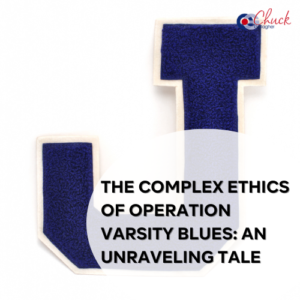The results can often be explosive when ethical dilemmas and college admissions intersect. Just ask anyone familiar with the “Operation Varsity Blues” scandal. But the aftermath continues to make waves, teaching us invaluable lessons about integrity, accountability, and the allure of taking shortcuts.
results can often be explosive when ethical dilemmas and college admissions intersect. Just ask anyone familiar with the “Operation Varsity Blues” scandal. But the aftermath continues to make waves, teaching us invaluable lessons about integrity, accountability, and the allure of taking shortcuts.
This week, a new chapter unfolded in this saga as the 1st U.S. Circuit Court of Appeals in Boston handed down a significant ruling. Once a top executive at the esteemed private equity firm TPG Capital, William McGlashan sought to overturn his conviction related to the infamous college admissions fraud. His gamble? He had bet $50,000 to inflate his son’s ACT scores artificially. The court, however, had other plans.
For those of us advocating for ethical transparency and fraud prevention, McGlashan’s story offers a potent illustration of the pitfalls of ethical shortcuts. But let’s first delve into the case details.
The Crossroads of Ethical Choices
William McGlashan’s journey to the courtroom began with an indictment alleging his involvement in a wide-ranging college admissions scam. His primary defense was a claim many might find compelling on the surface: Can inflated ACT scores genuinely constitute the basis for a wire fraud charge?
Despite the intriguing nature of this defense, the appellate court wasn’t convinced. They leaned on a particularly insightful observation by U.S. Circuit Judge Jeffrey Howard, emphasizing that McGlashan’s strategy wasn’t just about tinkering with test scores. Instead, it had deeper roots. The orchestration extended to securing a specialized test proctor connected to the scheme’s chief orchestrator, William “Rick” Singer.
As we peel back the layers, the ethical violations become even more apparent. Singer, the central figure in this plot, wasn’t just aiding in altering test results. He was building a network where money changed hands, coaches were corrupted, and fake athletic profiles were created. The heart of the matter is that the privileged were trying to buy their way past the meritocracy that college admissions should represent.
The Ripple Effect and its Lessons
McGlashan is but one name in a list that exposed a societal flaw. Over 50 individuals, including celebrities like Lori Loughlin and Felicity Huffman, were caught in the web Singer spun. These actions don’t just harm the students involved or the institutions they aim to attend; they undermine trust in a system many rely upon as a measure of capability and achievement.
Interestingly, the same appellate court that ruled against McGlashan had previously overturned the convictions of two other parents embroiled in this scandal. This duality illustrates the multifaceted nature of the legal and ethical questions arising from Operation Varsity Blues.
Carter Phillips, representing McGlashan, voiced the frustration of a client who believed that ACT scores shouldn’t be deemed “property.” Yet, this perspective needs to recognize the broader implications. Whenever someone cheats or manipulates the system, it devalues the achievements of those who have worked hard and played by the rules. In essence, isn’t the integrity of the admissions process, and by extension, the futures of countless students, a form of collective property?
Reflecting on the Ethical Takeaways
This scandal isn’t just about wealthy parents trying to edge their children into prestigious colleges. It’s about the often-tempting choice between right and wrong. It is a stark reminder that even those in esteemed positions can fall prey to unethical temptations, especially when societal pressures loom large.
As a speaker on ethics and fraud prevention, my takeaway is clear: shortcuts, especially those that compromise our values, often lead to dead ends. The fallout from Operation Varsity Blues underscores the necessity of emphasizing ethics and integrity at every level of our society, from education to corporate America and beyond.
In a world increasingly defined by competition, it’s paramount that we prioritize principles over shortcuts. Only then can we ensure a fair playing field for all.


